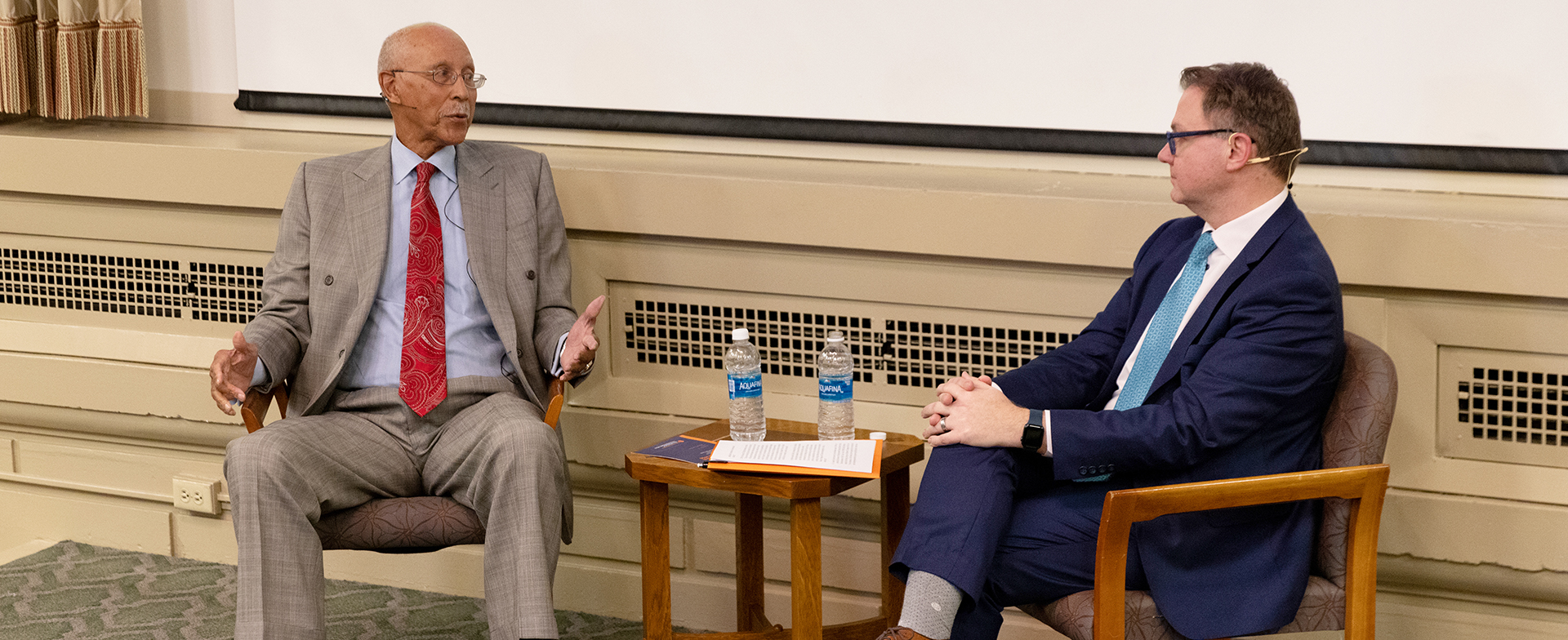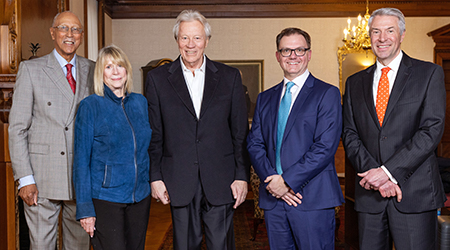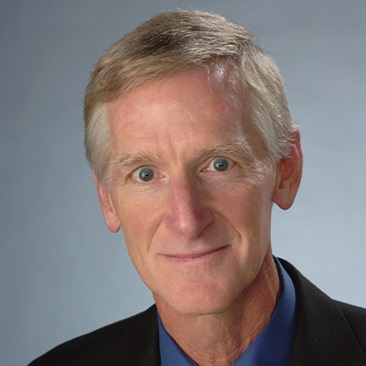
NBA Legend and Former Detroit Mayor Dave Bing: ‘We Need to Support Each Other Much More Than We Do’
March 2, 2023
The Maxwell School alumnus reflected on his life experiences and efforts to uplift others during a recent Renewing Democratic Community talk with Professor Chris Faricy.
Growing up in Washington, D.C., Dave Bing ’66 B.A. (Econ), H’06 said his classmates, teachers and neighbors were mostly all African American. When he joined Syracuse University in the fall of 1962 as a recruit to the men’s basketball team, his world felt upended.
“I didn’t know what to expect coming to Syracuse—I had never been to Upstate New York,” he told an audience that filled the Maxwell School Auditorium on a Friday afternoon in February. “I looked around and I didn’t see many people who looked like me. It was a rude awakening for me because, from kindergarten through 12th grade, I never went to school with anybody who didn’t look like me.”

The NBA Hall of Fame member and former Detroit mayor reflected on his early days on campus at the start of the conversation-style event moderated by Chris Faricy, associate professor of political science and the inaugural Hicker Family Professor in Renewing Democratic Community. The talk was part of a speaker series celebrating the creation of the professorship with a gift by Bing’s former Orange teammate, George Hicker ’68 B.A. (PSc), and his wife, Kathy.
Bing shared how the University’s student body of roughly 14,000 included only 100 Black students when he attended. Bing said he felt the sting of inequality and racism off campus and when traveling to games—once, he said, Coach Fred Lewis threatened to forfeit and take the team back to Syracuse after a hotel clerk directed the Black players to stay at a different hotel.
However, among his teammates and on campus, Bing said he found a community. “I received, in my opinion, an education not necessarily just in academics but in people,” he said. “What I cherish most here at Syracuse are the relationships that I developed, the friendships that I developed, the respect that we had for each other—not only as basketball players, but as people, because all of us came from different backgrounds.”
He added, “We all accepted each other for who we were, and we know we needed each other to deliver the dream that we had.”
Watch the Full Event
Bing was recruited to Syracuse University by football legends Ernie Davis ’62 and John Mackey ’63 B.A. (Hist). He became lifelong friends with roommate and teammate Jim Boeheim ’66 B.A. (Hist)/’73 M.S.Sc., now head coach of the men’s basketball team. With the fifth highest scoring average in the nation, Bing earned a spot on the All-American team and was drafted second overall by the NBA’s Detroit Pistons in 1966. He became one of the most celebrated basketball players of his era—the NBA named him to its Hall of Fame and in 1996 designated him one of its 50 greatest players of all time. In 2021, he was named to the NBA’s 75th Anniversary All-Time Team.
Faricy shared obstacles Bing faced, which are outlined in his 2020 autobiography, “Attacking the Rim: My Journey from NBA Legend to Business Leader to Big-City Mayor to Mentor.” He played, for instance, with limited vision from a childhood eye injury, and he was a married father while playing basketball for the University.
Turning the conversation to civil rights, Faricy asked Bing if he has seen changes in the role of student athletes from when he was on campus to modern movements such as Black Lives Matter.
Bing talked about the inequality he saw and noted activists at the time such as Stokely Carmichael, Malcolm X, H. Rap Brown, Angela Davis and Martin Luther King Jr. “As a youngster at that time, looking at all of them and what they were about and the things that they were exposing, it was easy, I think, to become angry and disillusioned with the system because we didn't think, even back then, that we were treated fairly. There was no equality.”
He added, “Fast-forward to today. There may have been some improvements in certain areas, but we have the same problems today. … And until such time we admit the fact that there is a major, major underclass in this country that needs help and figure out how we do that, how we help the less fortunate, how we try to treat them as equals, we're going to continue down this road.”

Faricy shared Bing’s success in promoting economic development, particularly in underserved Black communities. After retiring from basketball, he joined a Detroit steel company; and soon after, launched his own business processing steel for Michigan’s auto manufacturers. Bing Steel earned him the National Minority Small Business Person of the Year award in 1984, and later, the National Civil Rights Museum Sports Legacy award.
Faricy asked him, “What advice would you give to officials in Syracuse and Central New York who want to increase the percentage of minority-led businesses? What should we do to promote more Black businesses in Syracuse and the surrounding area?”
Bing emphasized the importance of opportunity, investment, persistence and planning. “I knew I wasn’t ready to be an entrepreneur when I left basketball,” he said. “I trained for two years in the steel business where there were no Blacks, and that was a strategy for me.”
Bing said 80 percent of his workforce was Black, He told the audience he wanted to be in Detroit to help the people that needed jobs, the people “that nobody cared about.”
“I look back in retrospect and I am very proud of what we accomplished because I had people who were employed by me early on, and I was there long enough to see their kids employed,” he said. “I know I helped families that way.”
Bing sold Bing Steel in 2007 and took office as Detroit’s mayor in May 2009 as the city faced debt, a shrinking population, high unemployment and failing infrastructure. Faricy asked Bing how he sought to restore trust in city government. Bing said he led by example, arriving to city hall early, working transparently, resigning from the lucrative corporate boards that he served on, and setting his own salary at $1 per year.
“If you go into politics to make money, you made the wrong choice,” said Bing. “You got to go in to serve.”
After leading the city through the largest municipal bankruptcy in American history, Bing turned from politics to philanthropy, founding the Bing Youth Institute (BYI), a nonprofit focused on mentoring Black boys in Detroit. Since its inception in 2014, the BYI and its mentorship program called BINGO has served six graduating classes and has a 100 percent high school graduation rate; 80 percent of the students are in college.
When asked if he sees assisting boys as an effective way to address major societal problems, Bing cited a lack of male role models as a major problem at home and in school. He noted that 52 percent of boys in Detroit who enter the ninth grade never graduate.
“I think the biggest impact that I'm making is what I'm doing now because I know I'm changing lives and I know I'm bringing some of these boys out of crime and out of poverty,” he said.
Members of the audience posed questions during the second half of the event. One attendee asked Bing to reflect on his ability to look outside of himself despite challenges he faced to address broader issues facing the global Black community.
“I don't think that we can be satisfied with where we are,” Bing replied, crediting his parents for setting him on the path to success though neither graduated high school. “…We need to support each other much more than we do and stop just giving that meaningless lip service. …I don't think there are any easy answers, but entrepreneurship is one of the ways that I think a lot of us can get out of where we are today.”
By Jessica Smith and Jessica Youngman
Published in the Spring 2023 issue of the Maxwell Perspective
Watch the Full Event
Related News
School News

Apr 18, 2025
Commentary

Apr 17, 2025
School News

Apr 17, 2025
